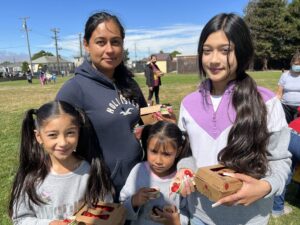
What does our school food program look like in action? The Conscious Kitchen team set up at John Herbert Davis Park in San Pablo with our partner, West Contra Costa Unified School District (WCCUSD), to showcase what is possible with fresh, local, organic school-supported agriculture programs like ours. The WCCUSD Food Truck pulled up to one of the summer meal sites that serves students in West Contra Costa County to provide lunch alongside two of our local organic farmer partners. On the menu for over 400 guests were scratch-cooked burritos made with 100% organic ingredients and organic seasonal produce.
The families were excited to not only taste the delicious handmade burritos with Mindful Meats beef, Lundberg Family Farms rice, Edison Grainery beans, Marin Cheese cheddar and La Tortilla Factory tortillas; bagels from Alvarado Street Bakery; stone fruit, ripe berries, and heirloom cherry tomatoes at the peak of the season, but also to learn that these are the types of meals served regularly to their children in school.
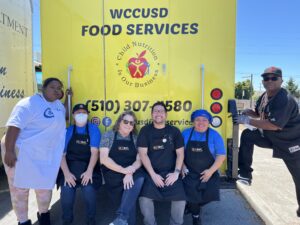
During the 2021/2022 school year, Conscious Kitchen increased organic procurement for the WCCUSD school food program from zero to fifty percent, and will continue growing that in the coming year. This unprecedented opportunity is possible because of our cultivation of partnerships with local organic farmers and food purveyors. Boxes of the local organic bounty — peaches, plums, nectarines, heirloom cherry tomatoes, raspberries, blackberries and strawberries — were taken home by the crowd, who eagerly lined up around the block for hours to taste the fantastic free meal enjoyed outside on a beautiful summer day!
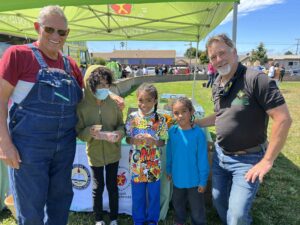
“We’re learning how these amazing orgs are working with farms like us to create an equitable, healthy, and climate-smart school food system — so that all students can fall in love with nutritious and delicious organic foods!… We’re paying the bounty forward and pushing for local change. Better school lunches with organic food and even brighter futures!” as the Frog Hollow Farm team shared. The owners of Frog Hollow Farm and JSM Organics are two local heroes and leaders of the movement. Farmer Al, of Frog Hollow Farm in Brentwood, went to school in the district years ago, before starting his famed organic regenerative farm in West Contra Costa County in 198. Javier Zamora, of JSM Organics in Monterey, launched his organic farm with one acre in 2012 and now owns and operates 200 acres with a variety of organic berries, vegetables, and flowers.
With partnership and intention, there is little we cannot accomplish together for the good of our land, children and communities.
“The day was a culmination of so much work and an ode to the power of collectives. Seeing it all come together: our WCCUSD mobile kitchen (which was possible because of grant funding), the USDA visiting our site, farmers, and all supporting the event as partners with Conscious Kitchen. And the bottom line is that the parents and kids are excited with the meals we are serving and the changes we are making.” Barbara Jellison, WCCUSD Food Service Director and key champion of organic school food, spoke about the importance of this specific event in the larger context.
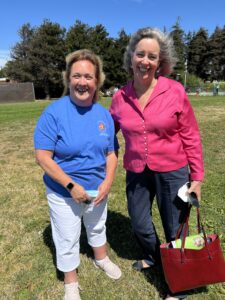
We were delighted to be joined by USDA Food Nutrition and Consumer Services Deputy Under Secretary, Stacy Dean; USDA Food and Nutrition Service Administrator, Cindy Long from Washington, DC; Nicholas Anicich, Director CDFA Farm to School Program; Kim Frinzell, Director, California Department of Education, Child Nutrition Services Division; and more dignitaries to celebrate the work that our collaborative team has accomplished with their multifaceted support, including CDFA Farm to School Incubation Grants. WCCUSD’s summer meal sites provide breakfast, lunch and snacks in central community gathering places – critical for all, especially the more than half of students who come from families with low incomes and face food insecurity. This initiative is also aligned with the Biden-Harris Administration’s commitment to feeding children healthy and nutritious meals year-round.
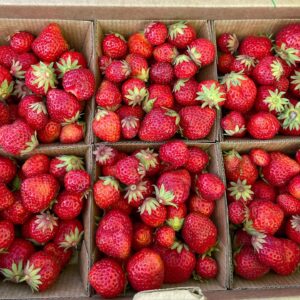
“It’s exciting. They are giving us fruits and we brought the kids, and they’re happy. They got their free lunches and strawberries and peaches. A lot of the kids don’t have lunches… providing this is very nice of them.” Ms. Mantera, a working mother who lives a few blocks away, believes in the importance of California’s implementation of free universal meals, especially for families that are low income, amid rising costs of food and other daily necessities.
Students, families, food service team members, government representatives, farm partners and volunteers alike were excited to get a taste – literally and figuratively – of what is coming for the 2022/2023 school year. With the strong leadership of WCCUSD Food Service Director Barbara Jellison and our teams working closely, FLOSN (fresh, local, organic, seasonal, nutritious) scratch-cooked meals will be served daily to the district’s 28,000 students across 54 schools.
“When you have a program where the community is all in — from the farmers to the families to the food service directors and entire team — there is nothing you can’t do. If our job right now is to heal our kids and the earth, we’re doing it! And energized to have the support of our leaders at all levels,” says Judi Shils, Founder and Executive Director of Conscious Kitchen, which has been partnering with WCCUSD since 2017 and active in the Bay Area since 2013.
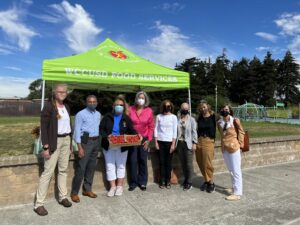
We are proud that our Conscious Kitchen programs continue to stand out as models for how cultivating, investing in and supporting the development of organic supply chains directly leads to better nourishing our kids, addressing health and equity challenges, caring for farmers and lands, bolstering local economies, and mitigating the negative impacts of climate change. In a state that is actively prioritizing farm-to-school pipelines, federal, regional and California state officials are taking notice of the vision, progress and far-reaching positive impacts of the healthy, just, resilient food system we are building on the ground in the East Bay. Change is possible, and it starts on the plate — winter, spring, fall and summer.